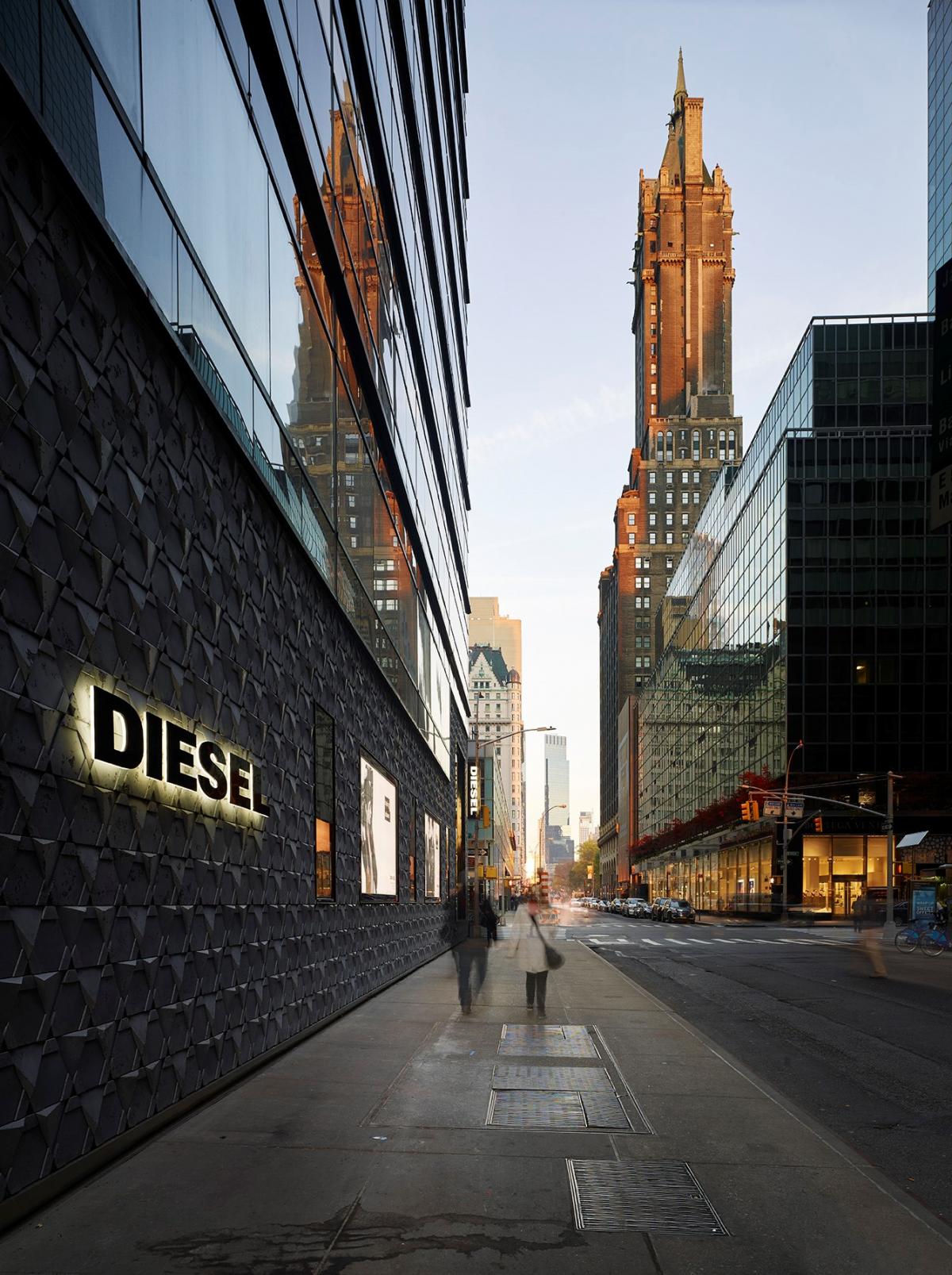

One of the other highlights of New York Fashion week was the opening of a new Diesel store on Madison Avenue. Most people would love the drinks and dances that come with such an event (I normally never know the supposedly well-known deejays that are playing on those occasions, let alone the celebs) but what I like more is the possibility of an interview with people who make the industry of fashion work. In this case I got a trio: Renzo Rosso, founder and owner of Diesel and of Only The Brave (the parent company of among others Maison Martin Margiela, D Squared, Victor & Rolf, Marni – a part at least), Nicola Formichetti (responsible for the first wardrobe of Lady Gaga, former artistic director of Mugler, and current artistic director of Diesel) and Alessandro Boglioli, the ceo of Diesel.

Nicola Formichetti, Alessandro Boglioli, and Renzo Rosso
As the interview takes place in the middle of the store, it’s not an easy task to keep the attention span on the questions and answers, as people walk in and out, taking pictures, saying ‘hi’, and eventually ‘goodbye’. But Renzo Rosso and his team are men on a mission: stating that Diesel is ready for the next 38 years. Ready to be cool again. Renzo: ‘I have been running this company for more than 36 years and I have worked really hard, also on Only The Brave. At a certain moment, I thought Diesel as a brand was tired. I needed to refresh the machine and put new people on the board. I brought in Nicola as a creative director and Allesandro as a ceo. They made the changes happen, together with me. One of the things I really wanted is to make Diesel into a premium brand. That is the only way to survive. I have learned this from working with designers on high-end brands at Only The Brave.‘
'Diesel is authentic and will be authentic. Always.'
Boglioli: ‘Doing this, taking Diesel onto a higher level, would mean losing sales. But were we ready to do that? That was a tough choice. We lost sales, of course we did, but we had to be consistent. Some of the stores that we worked with in the past, had to be cancelled from our list. We closed the first store we opened in New York, the one on Lexington Avenue, but decided to open this smaller store on Madison. At the same time, we keep the ones near Columbus Circle and in SoHo.’

The new store needed to be warm and cosy, a setting done by Wonderworld
The store is indeed smaller, but it feels cosy from the moment you walk in. There still is some raw feel to it, but the wooden cabinets, filled with jeans, make me feel like I've just entered a luxurious menswear store. Renzo: ‘We think we made the right choice. The investment (to redo stores) will be big, but we have to do it now. As you can see, it’s a smaller store, but a cosy, homey one. This is not a supermarket. Again, it was a tough choice, but there was no other way.'
Diesel needs to be cool again, says Renzo Rosso
The limited edition boot for the NY store
There's still a major focus on jeans, although full fashion silhouettes are dropped on both sides of the store. Accessories are everywhere, even a few limited edition boots and handbags, that will only be sold in this NY store. Being cool is one thing, but getting ready for tomorrow another. 'Anyone can wear denim', says Nicola. 'Jeans can be very universal, but it needs to be special if you want it to live within that cool universe. I can say we are hands on if it comes to the innovation of fabrics. I think it's a luxury to be able to search for new ways all the time. In our headquarters in Italy, we have a big innovation lab, where we test just about everything. I'm pretty sure we will be the first one to take jeans to the digital level. We will be reading our e-mail thanks to our jeans. And never for a minute think that we will make robots, Diesel is authentic and will be authentic. Always.'
A special limited edition bag that will only be sold at Diesel NYC
Boglioli: 'In fact, sales work both ways: you need the online, and you need the brick-and-mortar shops. We do extremely well online, hitting double digit growth since the start-up in September, but we put our money in the real stores as well. Not only with this New York opening, we plan opening a store in Tokyo and we have major refurbishments planned for our European stores, in Munich, Barcelona and Paris. Europe has always been very important for Diesel, althought Japan has always been our Nr.1 market. And then there's China. Lots of colleagues have overdeveloped there, but we were slow. The last two years the Chinese buy less traditional fashion, which is good for us.'

The new Diesel store features lots of wood, carpets and yet, some concrete too.
All three are aware of the many changes and challenges that are currently causing distress in fashionland. Do we still need fashion shows? And when exactly should we program them? Who will be sitting in the audience? And when we sell the clothes? How will we sell? Only online? Or in real stores? Etcetera. Renzo: 'I think we want to be part of the change, but we need to be respectful towards everyone. We have to be realistic when it comes to deadlines. We shouldn't go too crazy.' Nicola: 'I think we will come up with a new idea of exclusivity. And yes, magazines become less important, but do they really? There's always a backlash somewhere.'

